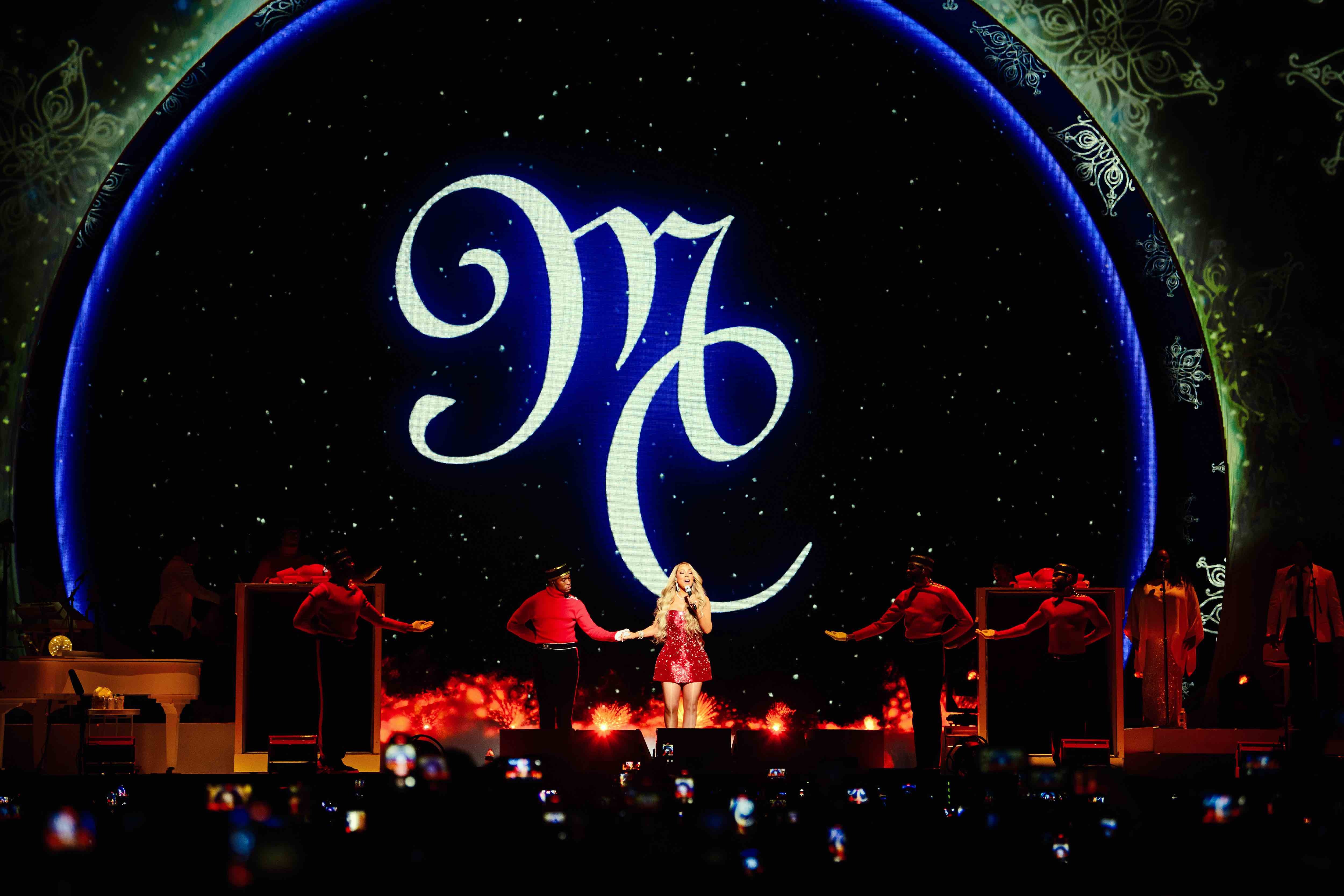How Mariah Carey’s Spectacularly Diva-Drenched Show in Detroit Was the Energy We Need Heading into 2024
The Queen of Christmas brought much more than holiday cheer to Motown

On the first day of December, as it should be every year, Mariah Carey gave one of the most Mariah Carey shows I’ve ever seen in front of a sold-out crowd at Little Caesars Arena, which was part of her “Merry Christmas One and All!” tour. Of course the gay icon, a GLAAD Ally Award winner, performed a mix of Christmas songs — culminating in “All I Want for Christmas Is You,” the encore closer — and some of her No. 1 hits. She even blessed us with more obscure snippets from her catalog. Updated arrangements on some of her most signature songs gave her room to play vocally, her voice robust and strong. But during the concert, what she really also performed to particularly delicious effect was the art of being Mariah.
There was the side table holding what I imagined to be hot tea, scooted out just minutes before she appeared onstage. There was the very present diva affectation, in full effect on words like “mesmerizing,” used while casually referring to the experience of taking her kids for a ride in — what else? — an actual two-horse open sleigh. And unfortunately for Mariah (and the sound guy), but amusingly for the audience, there was an in-ear situation that played out in real-time. That reminiscent-of-NYE snafu came quickly, right after the first full song, a gorgeous, more vocally improvised version of “Hark! The Herald Angels Sing,” which she originally sang on her 1994 “Merry Christmas” album.
I almost wish a very real moment like the sound issue was part of every show (she called it “very behind the music”), given the way it seemed to immediately disarm Mariah, who rolled with it, making it hard to tell how bothered she actually was. “This feels like feedback, and we don’t want to get feedback like that. We like good feedback.” Then, with (I think) feigned exasperation and a chuckle, she added, “Ooh, nobody understands what I’m going through!” Maybe after you’ve had to call out the sound guy in front of 13,000 people just as the show starts, it’s easier to just go with the flow?
This level of improvisational freedom that Mariah committed to for the 90-plus minute show was even more inspirational than the inspirational numbers, like “Hero” and “Fly Like a Bird,” that she belted — seemingly looser than usual (maybe it was the city's Motown energy?) and hilariously off the cuff, she was giving the greatest hits beyond her actual music hits. She loves a tea-sippin’ moment; she loathes an in-ear fail. We got both. Less surprisingly, her “glam squad” came out a couple of times, too, to give her an onstage hair and makeup refresh.

But I’ve already gotten ahead of myself. All of this, you should know, is coming from someone whose fandom runs so deep there’s almost no way to encapsulate it in this brief note about my subjectivity but to say there is nothing except a live Mariah performance that can take me out of myself while also putting me so in touch with myself at the same time. (I also wrote about my relationship to her music for The New York Times, just to give you an idea of how big this feeling is.) My friend Jim attends the show with me whenever she comes to town as much to marvel at me magically aging backwards as he does to see the performance.
As a gay kid, I drank from Mariah’s nourishing fountain of songs to help get me through tough teen years. In a way that sometimes only a connection to an artist through their music can, and desperate for a kind of representation that was lacking when I grew up in 1990s, I always felt like she was rooting me on when, as a child who felt inferior, I didn’t feel like I had a lot of people who understood me. So, when I show up to a Mariah concert, I’m cheering her on as much as I think I’m cheering on parts of younger me that are firmly attached to memories I created through her music, which became the soundtrack to my formative gay years. It’s deep!
But it’s why I lost my mind when, on Friday, she looked toward my section while singing “Make It Happen,” a song I used to watch her perform during a Madison Square Garden concert in 1995. The song encapsulates her rags-to-riches story, that feeling of feeling lesser but rising above your circumstances, and it fueled me just as I was entering my teen years. But it’s her aside during it that I obsessively watched at that age to just feel, well, seen: “I see you up there!” she tells a portion of the crowd at that show.
When she said those exact words while looking somewhat in my direction at the Detroit show, it was like she was speaking to my 16-year-old self, who was really the one attending this concert.
I’ve seen Mariah in concert several times since 1999, but this show just felt even more spectacularly unrestrained. I was worried about how she would sound, nothing that she doesn’t already consider herself (“Some days for me I have to be a little bit more experimental and play around on stage because maybe it's not as strong for that minute,” she told me during our 2016 interview). I wondered why she seemed more reserved than usual in some new interview clips while doing her usual Christmas press tour.
This performance, though, did what the best Mariah shows do — it excelled in letting fate decide how exactly the show would go, despite “Fame” icon Debbie Allen’s rehearsed choreography and Mariah’s commitment to, yes, her craft, but also to coming off as splendidly unrehearsed. Mariah sounded divine, particularly on “We Belong Together,” which she performed in full, and “Miss You Most (at Christmas Time),” which, if you’re a Mariah fan, you know why it’s special. She rarely sings it, even though she should. Watching her perform an extended section of the song (and nailing it) was all I wanted for Christmas, as it turns out.
Impromptu “tangents,” as she calls them, really set this show apart — her divadom was on full display, which is now turned up and as much a part of a Mariah show as the music, oftentimes both performance aspects working terrifically in tandem. This was the case when she ad-libbed after her musical director Daniel Moore began playing “The Roof,” from her 1997 album “Butterfly,” on the piano. “I don't think we're doing that one tonight,” she said, laughing, the “I don’t think” part so delightfully diva-ish, you couldn’t help but feel Aretha’s presence in her delivery.
Her tone was much like when she talked about the weather: She had heard it was going to snow in Detroit, but “it rained instead, and that’s OK.” Maybe she really thought it was OK, but she sure didn’t sound like she thought it was.
As Moore continued to play “The Roof,” she acknowledged that he’s from Battle Creek, Michigan, which then turned into its own little ditty as Mariah vocalized “Battle Creek, Michigan” to the tune of the song.
Similar banter occurred elsewhere in the show, like before she did her song “It’s a Wrap” and encouraged audience members to do the viral TikTok dance it spurred, but also said, “If you don’t wanna do it, then obviously don’t do it.” When one fan got her attention with whatever they were holding up, she remarked, “I'm not sure what you're showing me, but it looks like something fun.”
Friday night, amid the divadom, I caught a sweet moment: Mariah, the mother, was leaving the stage as her son Roc played her off, except she didn’t leave the stage completely. Smiling, she stood off to the side, watching him perform until he was finished, then walking backstage. She also held her daughter Roe’s hand during their emotionally resonant collaboration on “Jesus Born on This Day,” a Mariah original that, like “All I Want for Christmas Is You,” sounds like a classic that has always existed. The timelessness of those songs is a testament to her talent, which author Andrew Chan wrote about at length in his new book “Why Mariah Carey Matters.”
“It has always been easier for the casual listener to assume Mariah is an interpreter of material rather than the auteur behind it,” he writes.
At her Detroit show, she wasn’t necessarily trying to make any points (except maybe to that sound guy) about her voice or her songwriting, but just by being Mariah Carey with a live mic, she demonstrated something all her own, a performance in and of itself that I know I’ll be taking with me into 2024 — the aspirational ability to be at least seemingly unbothered. May this next year be one of good feedback only for all of us.










